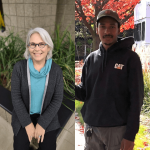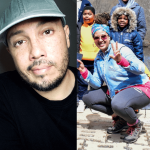Maritza Mendoza
Washington, DC
Maritza (she/her/ella) is a first generation mexican-american raised in the Piedmont region of NC. Her passion for our natural world started at an early age, from watching ants and snails in her driveway and playing soccer. She was fortunate enough to pursue her interests in school, obtaining her Bachelor’s in Environmental Science from UNC-Chapel Hill and a Master’s in Marine Resource Management from Oregon State University. Following her studies, she led community conservation projects in the Pacific Northwest and in North Carolina.
She joins GreenLatinos eager to amplify the voices of our comunidades to shape water and ocean policies that allow us to thrive. When not tromping around outside, Maritza loves cooking large meals and discovering a myriad of artists and storytellers who connect and inspire us with our stories of joy and true liberation.
This interview was conducted by Carly Schmidt on August 16, 2023. Learn more about Maritza’s work at https://www.greenlatinos.org/.
Carly Schmidt: Thank you very much for joining me. I’ll kick us off with this first question: What is your role at GreenLatinos and what drew you to the organization? I saw some lovely language in your bio about finding joy in this work. I’m also curious about where you’re finding joy these days.
Maritza Mendoza: Yeah, that’s a great question. My title is Water, Equity, and Ocean Program Advocate at GreenLatinos and, essentially, because GreenLatinos is an active comunidad of members across various fields, my role is to follow water and ocean policies, and bills at the Federal level, and share that information and these resources with our members and communities. We serve as conveners and make sure that people are connected to the people they need to be connected to.
What drew me to GreenLatinos was really wanting to get back to my training. I studied marine science in school, but didn’t feel like academia was the place for me. Working in policy was really interesting to me, especially at this Federal level, because I didn’t know that much. I knew more about local and state policy, but I recognize how Federal policies are important and do impact our daily lives. Also because [this job] was working with my community and was a way to learn more about who is, quote unquote, “a Latino.” Often all the different aspects of Latinidad may or may not get centered due to anti-Blackness, colorism, and other systems present in my community. Knowing this, I wanted to further understand how they show up, so we can work through together how we can untether ourselves from these systems.
Joy is very important to me because this work is very exhausting sometimes, and often heartbreaking to understand all the injustices and inequities that continue to be perpetuated. I think, for me, remembering that I’m human, and that part of my emotions are joy and pleasure and connection, helps me bring [joy] in. I find a lot of joy in connecting, in our caucus and in other coalitions, and having conversations with folks and learning more about what keeps them motivated and how they are finding their own joy. That helps me connect as well.
Carly: Thank you so much for that. I think so many folks on our team could relate to that, too. Federal policy work in particular is so hard and, like you said, so heartbreaking, but there’s something about these moments of bringing folks together and sharing ideas. There’s something inherently hopeful about that. I’m curious about what is on your radar these days at GreenLatinos? What initiatives and programs are taking up most of your time?
Maritza: Well, I feel like oftentimes in the water spaces we forget about the ocean. Right now, through another coalition we’re part of called the Ocean Equity Collective, which includes only BIPOC organizations and folks, we are organizing our inaugural Ocean Equity Summit, which is going to be a space for our communities of color to come together and share our own stories around ocean stewardship and conservation. There’s a lot of focus right now on the climate crisis and the role that the ocean and coasts play for disaster resilience and community resilience. I’m really excited to create space for us to share these solutions and build our own power because oftentimes we are excluded, especially our coastal communities and other communities of color that do have a lot of expertise on marine life and restoration. I’m excited to be planning that.
Also, the Water Equity and Climate Resilience Caucus’s work around affordability is super important to us because we know water is life and I think it’s past time that we really continue to raise the alarm. People shouldn’t have to pick between rent or water and they shouldn’t have to travel [for water], and we should all have access to clean, affordable water. I appreciate being able to work with the Caucus around those issues.
GreenLatinos is a community of members, too, and we’ve been following what’s happening on the Rio Grande around the buoys that have been placed into the water. It’s a humanitarian issue, but also a water quality and access to nature issue. There’s a lot embedded into what’s happening on the border. I want to uplift the work of the Rio Grande International Study Center, the Eagle Pass Border Coalition, and the No Border Wall Coalition as well.
Carly: Thank you for mentioning your work on oceans, too. That’s a broad scope of work! There’s a lot of policy under the buckets you’re working in. Do you have any wisdom from living under this impossibly huge policy umbrella?
Maritza: What helps me feel not super overwhelmed with all these issues is just remembering that water is interconnected in so many ways. Water quality issues like drinking water, for example, how does stormwater infrastructure fit into that? How do we think about where the water is flowing into our coasts? And I think, for me, being able to see how things move helps me feel like maybe I can’t focus on everything at once, but I know that working on one [policy issue] will eventually connect the dots. But it’s not always easy.
Carly: You mentioned organizing the Ocean Equity Summit. What are your goals for bringing this group together in person? What is the objective?
Maritza: Specifically for this summit, a big goal is connection between different folks of color and our different values when it comes to the ocean, and finding joy and hope in those stories. Another goal is to share policy solutions and practices that we all collectively will push forward in the coming years. We will be very intentional about learning what our communities want to see when we are making these solutions happen. We are stronger when we have a shared vision and, like some people say, sing from the same sheet of music.
Carly: I like that, I’ve never heard that one before. GreenLatinos and River Network are both members of the Water Equity & Climate Resilience Caucus, as well as other coalitions like Clean Water for All and America the Beautiful for All. What, in your opinion, is the value of bringing organizers together in these kinds of policy-oriented coalitions?
Maritza: I always feel like there’s a lot of value in just seeing yourself as part of something bigger. These coalitions, especially in the policy space, are super important practicing spaces for finding and listening to different perspectives and experiences. They’re also important for prioritizing communities of color and those who have been most impacted and excluded from the decision-making process. We, at least in the Caucus, are really trying to practice doing that and are trying to evaluate how things are going. We’re also starting to do that work a little bit more intentionally as well in the Clean Water for All Coalition.
Carly: What other policy issues are top of mind for you right now?
Maritza: With all the investments we’ve seen, like the State Revolving Funds, we’re focusing on how these policies actually get implemented. It’s so important to recognize that, yes, funding is necessary and needed, but we need capacity building and technical assistance, too. We’re following that and making sure that gets done, but also how are we addressing the barriers and the systemic issues within federal policy?
With offshore wind development, for example, of course we need to transition away from fossil fuels but what does a just transition look like? How are we making sure that we’re not coming in with recommendations and also censoring communities of color and their priorities? How are we thinking about workforce development? There’s a lot of narrative shifting that we’re trying to pay attention to. It’s important for us to understand how folks are being listened to as we’re trying to implement these solutions that are so necessary to mitigate the climate crisis. But we don’t want to recreate harm and uphold the status quo, even if it’s going to help us meet our carbon goals.
Carly: How are these coalitions and caucuses balancing this urgency to make the changes we need to make to mitigate and adapt to climate change while also going back to the most impacted communities and prioritizing a just transition?
Maritza: In the Caucus, specifically, we take the time to let people ask questions. We also recognize how important it is to step back and make sure everybody is on the same page and has all the context that people who have been in this field for longer already have. We are also continuously asking the question: Who is at the table? We are doing that very intentionally, but we always see national groups [in these coalitions], so we need to think about what’s missing from the way we hold these spaces that is preventing folks from showing up. As we’re growing, it’s important for us to know who is being held accountable and how are we being held accountable? Who are we prioritizing? Can we slow down a little and make sure that we’re bringing along those who need to be at the table?
Carly: What impact would you like to see your work have in the years to come?
Maritza: Ideally, our Latine communities, and other communities of color, would actually have clean water and clean air. But also, I would love it if my work, or the work we’re doing together, reminds people of the value they have just by being human and living. All those experiences and wisdom is so important. Every person has wisdom and knowledge. I hope it becomes easier to share, and it becomes easier to be heard. I just hope that people really find value in their own stories and don’t feel like they have to show up in certain ways, or assimilate into these spaces, to get what they want and need.







